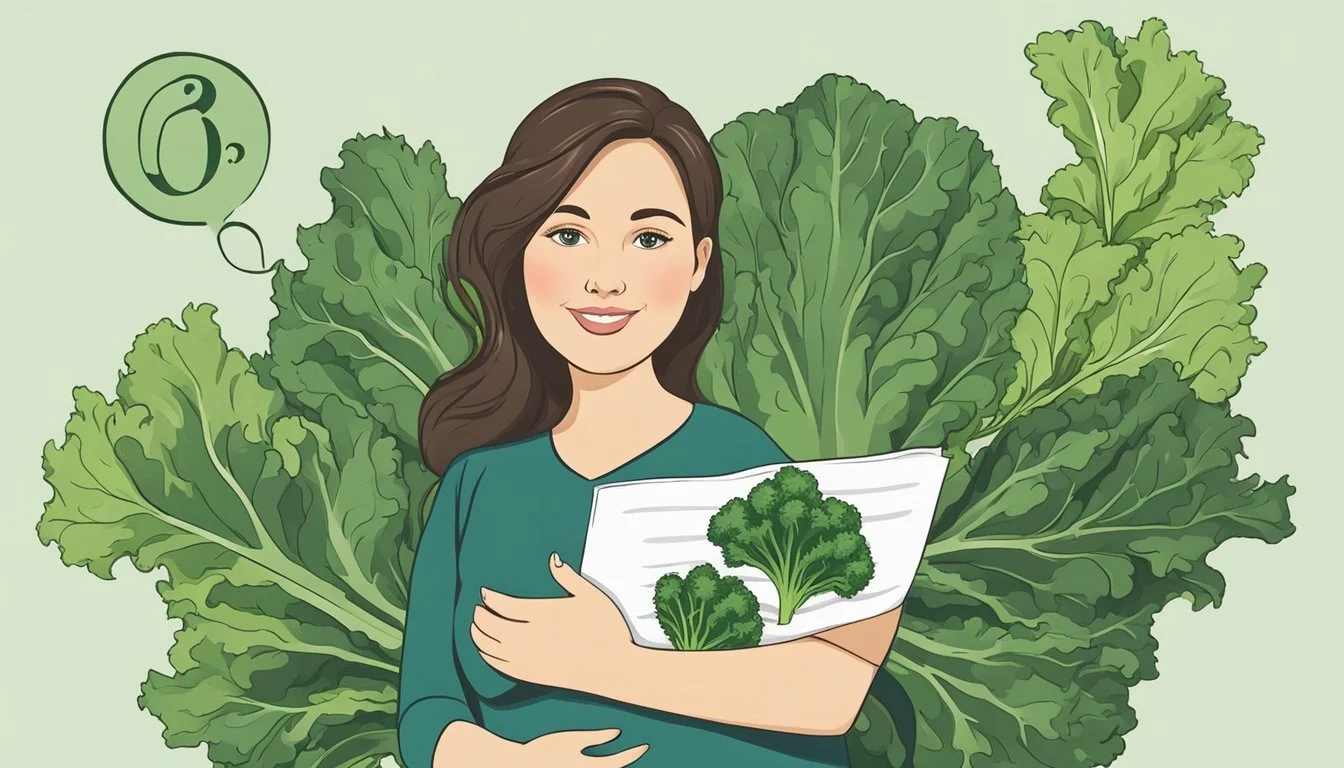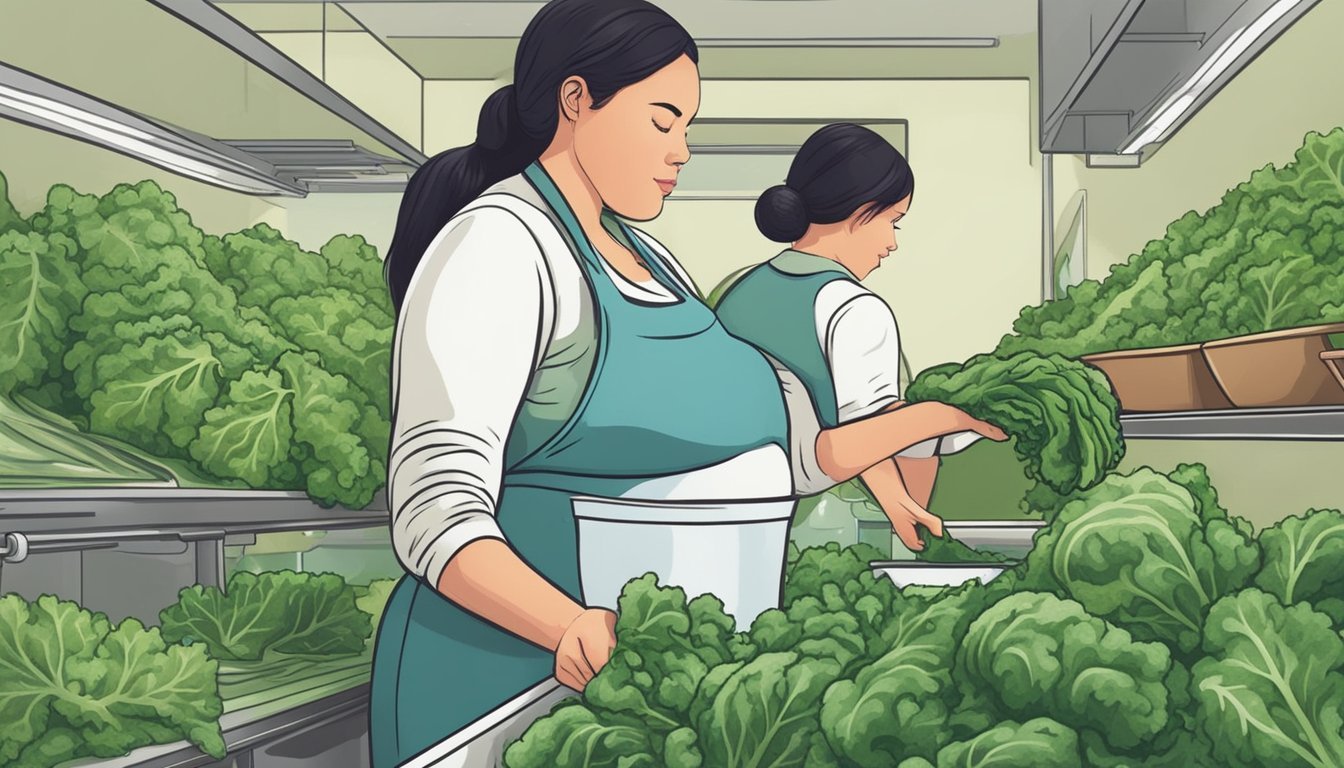Is It Safe to Eat Raw Kale While Pregnant?
Understanding Dietary Risks and Benefits
Eating a balanced diet during pregnancy is paramount for the health of both the mother and the developing fetus. Within the wealth of options available, leafy green vegetables such as kale are often recommended due to their high nutritional value. Kale, recognized for its dense content of vitamins and minerals, is particularly noted for its high levels of vitamin K, which is essential for proper blood clotting and bone health. The consumption of adequate vitamin K is especially important during pregnancy, and a cup of raw kale can provide nearly the full recommended daily amount for expectant mothers.
The safety of consuming raw kale while pregnant has been the subject of some discussion, as concerns are often raised about foodborne illnesses that can affect both the mother and her unborn child. However, when handled and prepared correctly, raw kale can be a safe and nutritious addition to a pregnant woman's diet. It supplies a rich array of nutrients including fiber, antioxidants, and a host of vitamins that contribute to a healthy pregnancy.
Despite the benefits, it's crucial for pregnant women to consider food safety guidelines when including raw vegetables in their diet. Thorough washing and proper handling of raw kale can mitigate potential risks, such as exposure to harmful bacteria. The general consensus from various health authorities is that with these precautions, the inclusion of raw kale is not just safe but can be advantageous during pregnancy due to its substantial nutritional contributions.
Nutritional Profile of Raw Kale
Raw kale is a nutritional powerhouse, especially significant during pregnancy for its vitamin and mineral content. It is low in calories and abundant in fiber, making it a beneficial component of a maternal diet.
Vitamins and Minerals in Kale
Kale is an excellent source of several important vitamins and minerals:
Vitamin A: Essential for fetal development and vision, a cup of raw kale contains approximately 50.6 mcg of vitamin A.
Vitamin C: Provides immune support; raw kale is rich in this antioxidant.
Vitamin K: Crucial for blood clotting, one cup offers a substantial amount.
Calcium: Important for bone health, present in significant quantities in kale.
Iron: Necessary for blood production, with kale being a respectable plant-based source.
Potassium: Helps with blood pressure regulation.
Folate: Especially important during pregnancy for fetal development.
Caloric Content and Fiber
Raw kale is noted for its low caloric content:
Calories: A one-cup serving contains only about 7 calories.
Fiber: With close to 0.8 grams per cup, kale aids in digestion and provides a feeling of fullness.
Comparison with Other Leafy Vegetables
Compared to other leafy greens, kale stands out for its nutrient density:
Higher antioxidant levels: Including vitamins A, C, and K compared to lettuce and spinach.
Richer in calcium and iron: Essential minerals that are present in greater amounts than many other green vegetables.
Comparable caloric content: Similar to other greens, kale has a low calorie count, but with a more robust nutrient profile.
Health Benefits of Kale During Pregnancy
Kale, a nutrient-dense superfood, offers a spectrum of benefits for both expectant mothers and their babies. Its rich vitamin and mineral content supports maternal health, fetal development, and can ease common digestive issues during pregnancy.
Effects on Maternal Health
Kale is an excellent source of vitamins and minerals crucial for a pregnant woman's health. Vitamin K, found in kale, is essential for blood clotting and bone health, with just one cup providing nearly the entire daily requirement of 90mcg. Additionally, kale's folic acid, also known as folate, is critical in protecting the baby against neural tube defects and supporting the mother's heart and blood vessels.
Benefits for Fetal Development
The nutrients in kale contribute significantly to fetal development. Its high folate content is vital for the formation of the neural tube and can help prevent birth defects. Moreover, the antioxidants and essential nutrients found in kale can support the developing baby's immune system and overall growth.
Influence on Digestion and Constipation
For digestive health, kale is a beneficial addition to a pregnancy diet due to its high fiber content. Fiber aids in smooth digestion and can help prevent the discomfort of constipation, which is a common issue during pregnancy. Including kale in the diet keeps the bowel movement regular and contributes to a more comfortable pregnancy experience.
Risks and Precautions When Eating Raw Kale
Eating raw kale during pregnancy requires careful consideration due to potential health risks associated with contaminants, vitamin K content, and its effects on digestion. Pregnant women should be aware of these factors to ensure their safety and the well-being of their unborn child.
Potential Contaminants in Uncooked Vegetables
Uncooked vegetables, including raw kale, can harbor harmful bacteria such as E. coli, Salmonella, and Listeria. These bacteria can lead to foodborne illnesses, which are particularly risky during pregnancy and may result in miscarriage or fetal harm. Toxoplasma gondii, a parasite found in soil, can also contaminate kale and is known to cause toxoplasmosis. Pregnant women must wash vegetables thoroughly under running water, even if labeled as 'pre-washed', to minimize exposure to these contaminants. Organic kale can reduce the risk of pesticide exposure, but it does not eliminate the need for proper washing as organic produce may still carry bacteria.
Impact of Vitamin K on Pregnancy
Kale is rich in Vitamin K, which plays a crucial role in blood clotting. While it is an essential nutrient, pregnant women taking blood thinner medications should monitor their raw kale intake to prevent excessive Vitamin K from interfering with the effectiveness of their medication. Expectant mothers should consult with healthcare providers about the right amount of Vitamin K in their diet, as it is usually safe and beneficial for both the mother and the fetus in controlled amounts.
Raw Kale and Digestive Issues
Consuming raw kale may lead to digestive issues during pregnancy, such as bloating and gas, due to its fibrous nature. The cell walls of raw vegetables are robust and can make it challenging for some individuals to digest them effectively. Cooking kale may enhance its digestibility and reduce discomfort for those with sensitive stomachs. Pregnant women might consider lightly steaming kale to retain most of its nutrients while making it easier to digest. Avoid raw sprouts, such as alfalfa or mung bean, which are associated with a high risk of bacterial contamination and are not recommended for pregnant women.
Incorporating Raw Kale into a Pregnancy Diet
While raw kale is safe to consume during pregnancy if prepared properly, it's important to consider how it's integrated into one's diet. Rich in vitamins and minerals, it offers many benefits when included in a variety of meals and drinks.
Kale-Based Recipes and Meal Ideas
Kale can be a versatile ingredient in many pregnancy-friendly recipes. It's an excellent addition to:
Salads: Toss chopped raw kale with a variety of other vegetables and a light dressing.
Chips: Make kale chips by baking torn kale leaves with a touch of olive oil and sea salt until crispy.
Soup: Add chopped kale to soups during the last minutes of cooking for a nutrient boost.
Sautéed dishes: Sauté kale with garlic and a bit of olive oil for a quick side dish.
Baked goods: Incorporate finely chopped kale into quiches or frittatas for enhanced flavor and nutrition.
Dips: Blend raw kale into hummus or yogurt-based dips for added color and texture.
Smoothies and Juices for Pregnancy
Raw kale can be a nutrient-packed ingredient for smoothies and juices, offering a convenient way to consume essential vitamins:
Application: Add raw kale to fruit smoothies for added nutrients without significantly altering the taste.
Variety: Mix kale with apples, bananas, or berries to create a sweet, nutritious drink.
Enhancements: Incorporate a tablespoon of chia seeds or a scoop of protein powder to enrich the smoothie or juice.
Salad Recipes Featuring Raw Kale
Salads are a staple for many expecting mothers due to their ease of preparation and nutrient density. Here are ways to include raw kale in salads:
Base ingredient: Use raw kale as the main green base for salads, complementing it with toppings like nuts, seeds, and sliced fruits.
Pairing: Combine kale with milder greens like spinach or lettuce to balance its robust flavor.
Dressing: Dress kale salads with citrus vinaigrettes or creamy avocado dressings to soften the leaves and add healthy fats.
Comparison with Other Cooking Methods
When considering the safety and nutritional aspects of kale for pregnant women, how kale is prepared can influence its benefits. Various cooking methods can affect the nutrient profile of kale, particularly its vitamin content and digestibility.
Steamed versus Raw Kale
Steamed Kale:
Nutrient Retention: Steaming kale has been shown to preserve antioxidants and minerals effectively.
Digestibility: This method also makes kale easier to digest, which might be preferable during pregnancy.
Raw Kale:
Nutrient Density: Eaten raw, kale maintains the highest nutrient content, inclusive of vitamins A, C, and K.
Fiber Content: The fibrous nature of raw kale may challenge digestion, but it is rich in dietary fiber.
Boiled versus Raw Kale
Boiled Kale:
Nutrient Loss: Boiling kale can lead to a significant loss of water-soluble vitamins like vitamin C and some B vitamins.
Soft Texture: It yields a softer texture, which may be gentler on the digestive system in pregnancy.
Raw Kale:
Vitamin C: Its vitamin C content remains intact when consumed raw, vital for both the mother's and baby's health.
Digestive Considerations: While nutritiously beneficial, kale’s tougher texture in its raw form may be less digestible.
Baked and Sautéed Kale Dishes
Baked Kale:
Flavor Concentration: Baking kale may concentrate its flavor and can make it into a crispy snack.
Nutrient Alteration: Some vitamins can degrade with the higher temperatures involved in baking.
Quick Cooking: Sautéing kale quickly can retain most of the nutrients while also softening the fibers.
Healthy Fats: This method allows the incorporation of healthy fats, like olive oil, which can aid in the absorption of fat-soluble vitamins like A and K.
Considerations for Organic and Non-Organic Kale
When selecting kale, especially during pregnancy, one must consider the distinction between organic and non-organic varieties. Organic kale is grown without synthetic pesticides and fertilizers, whereas non-organic kale, sometimes referred to as "conventional", may be cultivated using these substances.
Pesticide Residue: Non-organic kale has been identified to frequently carry pesticide residues. The Environmental Working Group often includes non-organic kale in its "Dirty Dozen" list, suggesting it has higher pesticide levels compared to other produce. Conversely, organic kale generally harbors fewer pesticides, making it a preferable choice for those seeking to limit their exposure to these contaminants.
Cost: It is critical to recognize that organic kale typically commands a higher price due to more stringent farming practices and certification requirements. During pregnancy, budget may influence the decision between organic and non-organic kale.
Health Standards: Pregnant individuals should ensure their leafy greens, whether organic or non-organic, are thoroughly washed to minimize exposure to any contaminants. However, the risk of exposure to potentially harmful pesticides is notably lower with organic kale.
Here is a comparison to aid decision-making:
Aspect Organic Kale Non-Organic Kale Pesticide Exposure Lower Higher Cost Higher Lower Contaminant Reduction Wash thoroughly Wash thoroughly
While pesticides are a concern for many, it is essential to note that both organic and non-organic kale are nutritious options. Pregnant individuals should weigh the potential risks and benefits, considering both the nutritional value and pesticide exposure, when opting for organic or non-organic kale.






